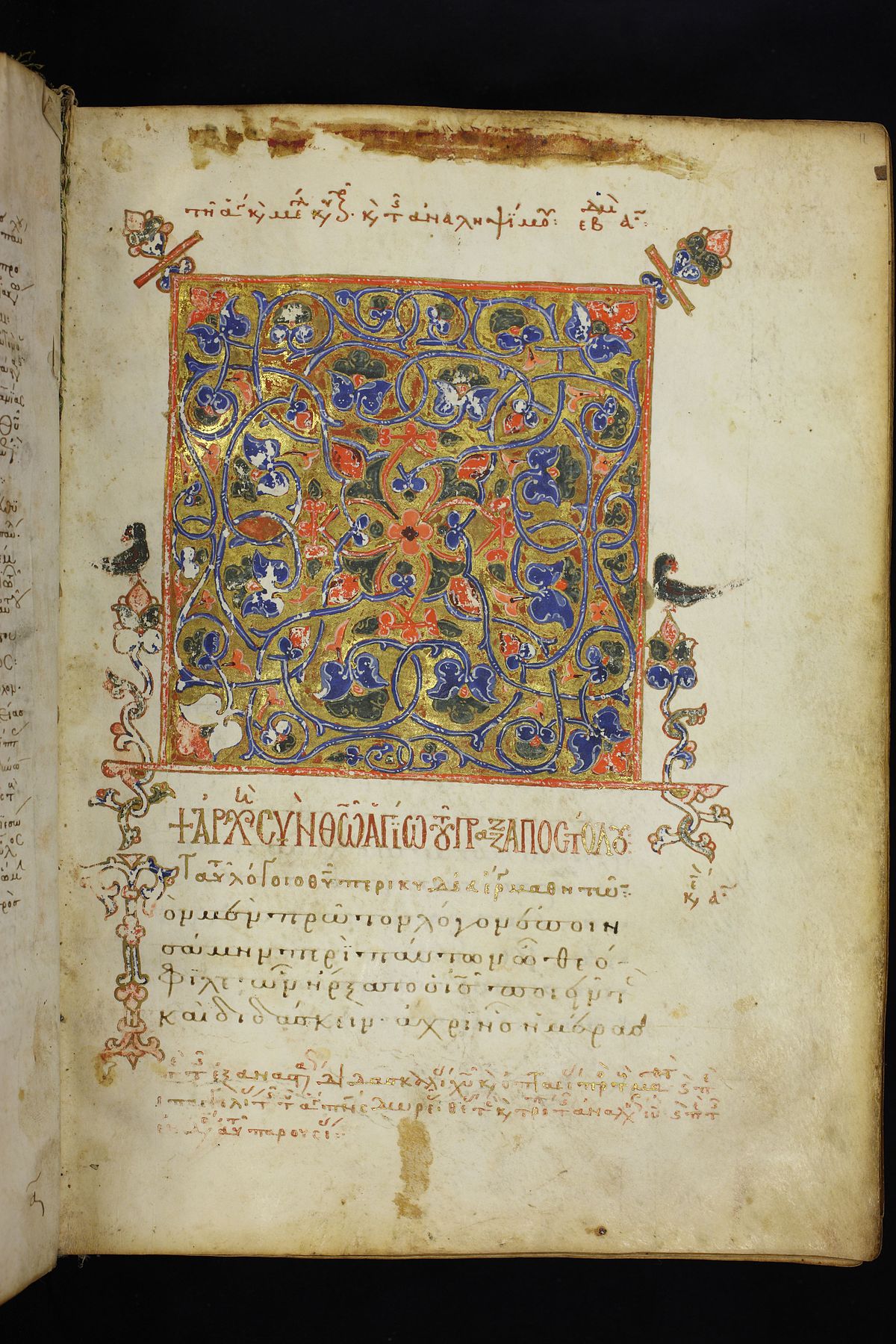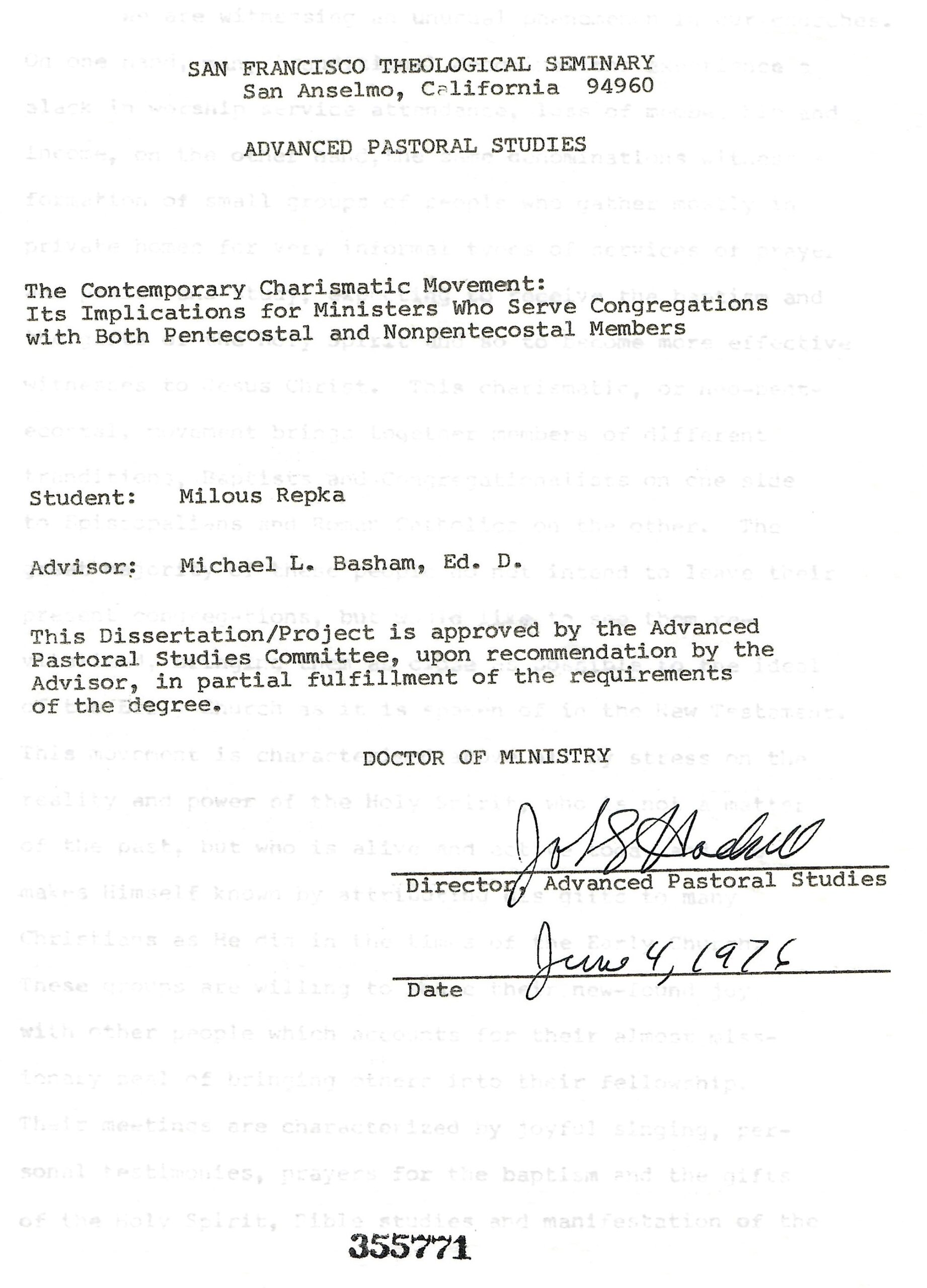“Humankind cannot awaken to his evolutionary spiritual Destiny until the spell of mythological and self-possessed thinking is broken. And the future whole bodily culture of humankind, in which East and West will realize a new cultural Synthesis, cannot take place until all the old religions are surrendered to the higher Principle or Truth that is the ultimate Master of religion.” – Secret Identity of the Holy Spirit of God
***
The Holy Spirit in the New Testament

Milous Repka (1925-2011)

There seems to be a contrast between the Synoptics and the Gospel according to John in the way they deal with the Holy Spirit. In Matthew, Mark, and Luke, “Spirit” or “Holy Spirit” occurs in the utterances of Jesus only very seldom, even though the major events in His life are vitally connected with the Holy Spirit. So we read that his coming was marked by the outpouring of the Holy Spirit upon Zacharias and Elizabeth (Luke 1:41, 67). According to Matthew 1:18, Mary was found to be with child of the Holy Spirit. When Jesus was baptized by John the Baptist, the Holy Spirit descended upon Him in the bodily form of a dove.(Matthew 3:16, Mark 1:10, Luke 3:22). Immediately after this act of baptism, Jesus was led up by the Spirit into the wilderness to be tempted by the devil (Matthew 4:1, Mark 1:12, Luke 4:1). After this experience, Jesus returned into Galilee “in the power of the Spirit” (Luke 4:14) and when He came to his own home town of Nazareth, we are told that He read in the synagogue a portion of the Scriptures from Isaiah the prophet, 61:1,2, “the Spirit of the Lord is upon me.” Jesus added that this Scripture was fulfilled in their hearing. (Luke 4:16-21). There are only five occasions in Matthew, Mark and Luke where Jesus is referring to the Holy Spirit. While teaching persistence in prayer, Jesus said that if men, being evil, know how to give good gifts to their children, “how much more will the heavenly Father give the Holy Spirit to those who ask him” (Matthew 7:11). In the same gospel 12:28 Jesus answers the accusation of the Pharisees that He casts out demons by the power of Beelzebub by saying, “But if it is by the Spirit of God that I cast out demons, then the Kingdom of God came upon you” and a parallel is recorded in Luke 11 !20 where “by the Spirit of God” is changed into “by the finger of God.” The third saying is found in Mark 12:36 where Jesus refers to David as being inspired by the Holy Spirit when he said in Psalm 110:10, “The Lord said to my Lord, sit at my right hand, till I put thy enemies under thy feet.” The parallel occurs in Matthew 22:43. In Mark 13:11, Jesus promises His disciples that when they shall be brought to trials, they should not worry what to say, for “it is not you who speak, but the Holy Spirit,” and the same promise is recorded also in Matthew 10:19 and Luke 12:12. Finally, in Mark 3:29, we read a very strict admonition of the Lord that the sin against the Holy Spirit shall never be forgiven. Matthew records the same admonition in 12:31 and Luke in 12:10.
In the Gospel according to John, Jesus is recorded as referring almost constantly to the Holy Spirit. In this Gospel, the Holy Spirit appears in two functions: in some verses He is spoken of as a present reality, e.g. 3:34 “God gives the Spirit not by measure” in the very similar way the Synoptics do. However, in the last chapters, especially chapters 14-16 called the Last Discourse, Jesus speaks of the Holy Spirit as the coming Counselor and Comforter which will be sent by the Father after Jesus’ mission will have been fulfilled. It seems rather strange that most of the discourses on the Holy Spirit appear, according to John, toward the very last part of Jesus* ministry. This can be explained by His desire not to leave the disciples without comfort. Also He wanted to assure them that His mission on earth had not ended in a failure on the cross, but would continue through the presence of the Holy Spirit. Through the Holy Spirit, Jesus would be always present to them.
In the book of Acts, the Holy Spirit is presented as the Creator of the Church (chapter 2), and His activity is followed in lives of many individuals like those of Samaria, who were baptized but did not receive the Holy Spirit until Peter and John came to lay their hands on them (8:17); Paul after his experience on the road to Damascus, regained sight and was filled with the Holy Spirit after Ananias had laid his hands on him (9:17); Cornelius, the centurion in Caesarea, and his household received the Holy Spirit and were baptized by Peter (10:44,48). In many cases, not in all, healing, speaking in tongues and other miracles occurred. It can be said that the book of Acts is the book of the activities of the Holy Spirit as the fulfillment of the promise of Jesus Christ, “But the Counselor, the Holy Spirit, whom the Father will send in my name, he will teach you all things, and bring to your remembrance all that I have said to you.” (John 14:26).
Paul in some of his epistles does not argue against some unusual and almost spectacular effects of the Holy Spirit, but he does not attribute to them the primary importance. “I will show you a still more excellent way…If I speak in tongues of men and angels, but have not love, I am a noisy gong and clanging cymbal.” (I Cor. 12:31, 13:1). I will comment more about Paul later.
The early church Fathers do not mention speding in tongues as the result of the baptism of the Holy Spirit. One reason might be that these dedicated men wrote in order to gain acceptance of the church by the hostile world of the gentiles. The reputation of the church among them was rather low. The Christians were accused of and blamed for many disasters such as earthquakes and floods; their worship services were misunderstood and wrongfully interpreted; and they were accused of eating human flesh. “Talking about tongues would only have added fuel to the fire that flamed into irrational rejection of Christians as monsters or, at best, queer people.”
Another explanation is offered by Kildahl who says that maybe the tongue speaking in the early church was rather insignificant and therefore did not merit being mentioned more often. Such great men like Origenes in the middle of the third century and Chrysostom, approximately one hundred years later, minimized the importance of gloss— olalia and argued that even if it were a valid Christian practice in the early church, it was not so any more. Augustine saw the importance of tongues for the early church, but claimed that this had passed away. Later, the gifts of tongues were attributed to some saints who were known for their missionary efforts, and their biographers maintain that these saints like Francis Xavier, Louis Bertrand and others spoke actual foreign languages that enabled them to preach the Gospel to different nations; however, they have had their share of troubles with other languages as Francis Xavier, who “in his letters to his superiors and other associates told of his difficulties in attempting to master such Oriental languages as Japanese.”
Reading the Gospels, one realizes that the authors attribute to the Holy Spirit unusual powers. These powers were evident in the lives of those who were close to Jesus and even more so in the life of Jesus Himself. He believed that in Him the Old Testament promises were fulfilled, and that He was the One of whom Isaiah and other prophets spoke.
It is rather significant that none of the Gospel writers mentions anything about “tongues.” None of the individuals of whom we read including Jesus Christ were filled with the Holy Spirit or spoke in tongues. Even Luke, who is the author of the book of Acts and who has so much to say about speaking in tongues in his second book, does not mention anything concerning tongues in his version of the Gospel. The only time tongues are mentioned is in Mark’s version 16:17-18 where speaking in tongues, and casting out demons, picking up serpents, drinking deadly things without harm and healing of the sick are the signs of those who shall believe in Jesus Christ and will be baptized. However, according to many biblical scholars, the whole portion of Mark 16:9-20 is of disputed authenticity, for some of the most ancient manuscripts end the Gospel according to Mark with verse eight of chapter sixteen. In other words, there is not much support for glossolalia to be found in all four versions of the Gospel.
The early church paid comparatively little attention to the doctrine of the Holy Spirit because it was busy formulating its belief concerning Jesus Christ, mainly the fact that He is man and God, as it is expressed beyond doubt in the Nicene Creed. Henry Van Dusen says, “Sometime between the early draft of the Nicene Creed in 325 and its final formulation authorized by the second “ecumenical” Council of Constantinople in 381, fifty-six years later, there were added these descriptive phrases: “The Holy Spirit, the Lord, the life-giver, which proceedeth from the Father, which with the Father and the Son is worshipped 3 and glorified, which spake through the prophets.” But nothing is mentioned about the operation of the Holy Spirit. The only activity of the Holy Spirit mentioned here is that He spoke through the prophets. Later, in 589 at Toledo, the statement “filioque” was added, thus clarifying the relationship between the Holy Spirit and Jesus Christ, that is the statement that the Holy Spirit proceeds from the Father and from the Son. Nothing is said to whom and for what purpose the Holy Spirit proceeds. It is clear that the church put out much effort to affirm the deity of the Holy Spirit, His place in the Trinity, His relationship to the Father and to the Son; however, not much is said concerning the Holy Spirit’s activity.
The following centuries bear witness to a fast development of the organized church. E.F. Scott speaks about that in the following way: “In the subsequent period, when the ecclesiastical idea had begun to overshadow all Christian thought, the belief in the Holy Spirit tended to disappear, or to have merely a formal value.”4 Since new sects with new teaching, disturbing the unity and the peace of the church kept cropping up, the leaders of the organized church saw it necessary to undergird their standing by attaching the authority of the Holy Spirit to the visible church. They declared that since the Scriptures were written by individuals who were led by the Holy Spirit, they can be understood only with the help of the same Holy Spirit. Since, as Gregory the Great maintained, ”The general councils of the Church were especially inspired by the Holy Spirit,” therefore they were authorized to interpret the Holy Scriptures. This idea of teaching and interpreting authority of the church finally culminated in 1870 when Vatican Council declared the infallibility of the Roman Pontiff when ex cathedra loquitur. So the role was reversed. The Holy Spirit, who according to the New Testament was the organizer of the Church, now became a sign of the authority of the visible Church.
